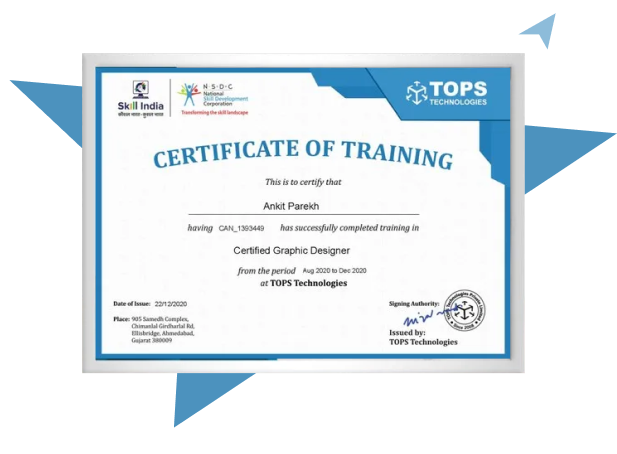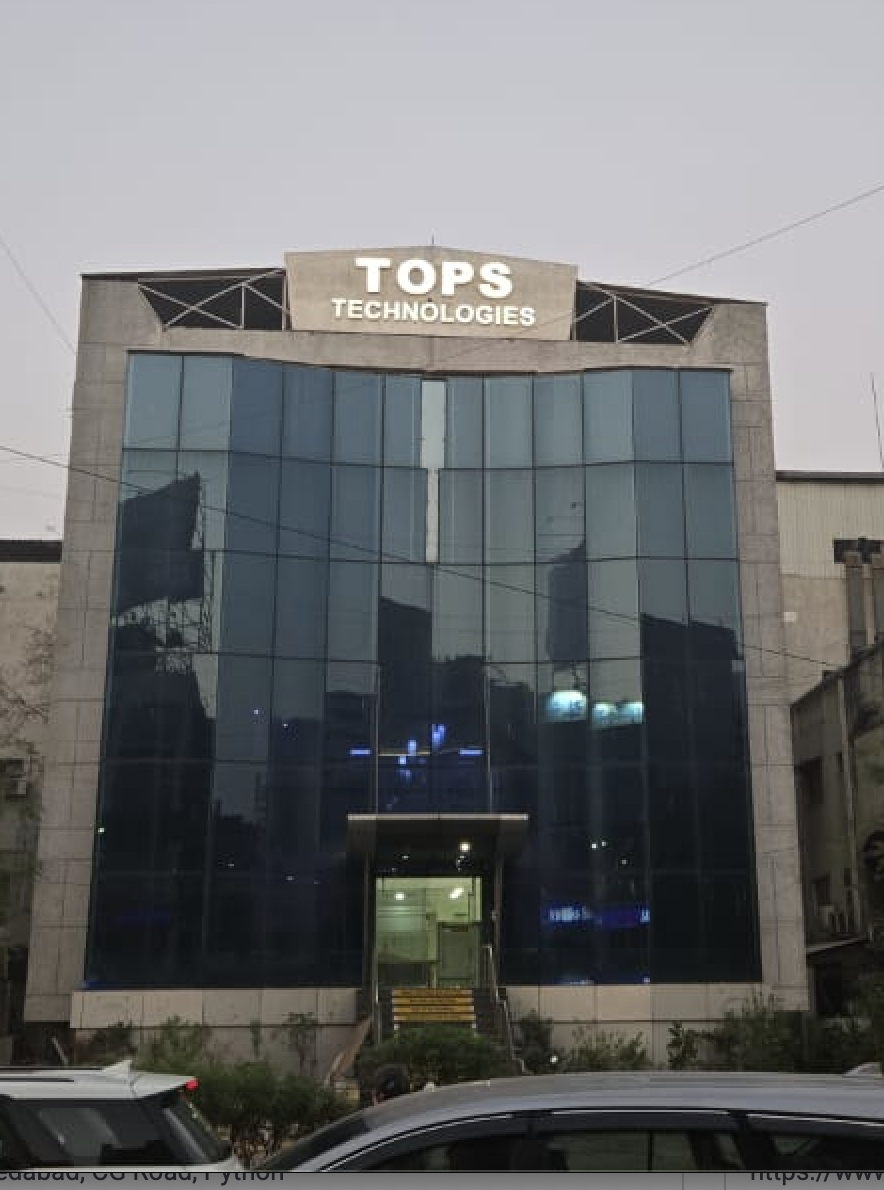Our Facts and Figures
1 Lac+
Student Placed
3000+
Companies TieUp
19+
Offices in India
50+
Industry Courses
Get 100% Job Assistance by enrolling in Certified Automation Testing Training Course
Key Highlights
Limited Students Batch
Personalised Attention
Highly Qualified Teachers
Flexible Batch Timings
Interactive Learning
Live Projects
Career Support
Job Oriented Training
Automation Testing Course Highlights
Automation Testing Courses in Ahmedabad — 100% Placement Assistance + Live Projects
Advance your career with Automation Testing Courses in Ahmedabad at TOPS Technologies, designed for beginners and professionals seeking hands-on expertise. Gain practical automation skills through live projects, guided learning, and receive 100% Placement Assistance to secure QA roles in leading companies. Ahmedabad’s growing IT ecosystem makes it an ideal place for technology training and career growth — learn more on Wikipedia.
TOPS Technologies has 4 training centers in Ahmedabad — CG Road, SG Road, Nikol, and Maninagar — making access easy for students across the city.
Why Choose Our Automation Testing Courses?
- Comprehensive training with 100% Placement Assistance
- Hands-on live project training for real-world experience
- Flexible weekdays and weekend batch options
- Expert trainers with industry experience
- Certification support and interview preparation
- Career guidance with mock interviews
Why Automation Testing Courses in Ahmedabad?
Ahmedabad has evolved into a thriving IT and software services hub, creating strong demand for skilled QA and automation professionals. Searches like automation testing courses and automation testing classes near me show that learners are actively seeking quality training locally. Our automation courses are tailored to match current industry needs, helping students build job-ready skills that local employers value.
Job Opportunities in Ahmedabad
Completing Automation Testing Courses in Ahmedabad opens doors to roles in various IT and software firms, including product-based companies, service providers, and startups. QA automation professionals are in demand with typical salary ranges starting from ₹4–6 LPA for freshers and higher for experienced testers. With our 100% Placement Assistance, you get support for interview readiness and employer engagement.
Job Designations After Completing the Course
- Automation Test Engineer
- QA Automation Specialist
- Test Automation Developer
- Selenium Automation Tester
- Functional Automation Tester
- Software QA Engineer
- Test Analyst – Automation
- Continuous Testing Specialist
Who Can Enroll?
- Fresh graduates and final-year students
- IT and non-IT professionals
- Software testers seeking upskilling
- Career switchers into QA automation
- Students wanting practical, job-ready training
What to Expect From This Training
- Industry-recognized certification
- Real-world automation testing projects
- Exposure to popular tools and frameworks
- 100% Placement Assistance
- CareerFest events and hiring drives
- Resume help and mock interview support
Curriculum Overview
- Introduction to Automation Testing: Basics and role in software QA
- Automation Testing Tools: Hands-on with industry-standard tools
- Scripting & Frameworks: Practical scripting and framework building
- Test Execution & Reporting: Real test cycles and result analysis
- Live Projects: End-to-end automation scenarios
- Interview Preparation: Mock interviews and resume optimization
Placement & Career Support
At TOPS Technologies, learners receive strong placement support through structured initiatives like JobFest, CareerFest / Campus Drive, and our dedicated Placement Cell. We help with resume preparation, mock interviews, and industry connections to boost your employability.
Student Testimonials
“I found excellent practical guidance with the automation testing courses here.”
“The trainers helped me understand tools in the automation testing course thoroughly.”
“I searched for automation testing classes near me and TOPS stood out for real project exposure.”
“This automation testing certification courses program helped me start my career in QA automation.”
Local Centers — Train at the nearest TOPS Technologies centre
TOPS Technologies CG Road
Address: TOPS House, 2, Chimanlal Girdharlal Rd, Shanti Sadan Society, Ellisbridge, Ahmedabad, Gujarat 380006
Phone: +919974755006
TOPS Technologies SG Road
Address: 102, Baleshwar Square, Iskcon Cross Rd, Sarkhej - Gandhinagar Hwy, opposite Iskcon Mandir, Ahmedabad, Gujarat 380015
Phone: +919904422211
TOPS Technologies Maninagar
Address: 401, Amruta Arcade, Maninagar Char Rasta, Lala Lajpat Rai Marg, Maninagar, Ahmedabad, Gujarat 380008
Phone: +919974863333
TOPS Technologies Nikol
Address: 401, TOPS Technologies, Hilltown Landmark, Nikol Canal Rd, Opp. Das Khaman, Nikol, Ahmedabad, Gujarat 380049
Phone: +917624007666
Other Local Insights
Students in Ahmedabad increasingly prefer practical, job-oriented courses that offer real-world experience. Automation Testing Courses in Ahmedabad meet this demand by combining expert instruction with automation tools exposure and live project assignments.
Final CTA
Step into the future of QA with Automation Testing Courses in Ahmedabad at TOPS Technologies. Gain industry-ready skills and 100% Placement Assistance support from day one.
Advanced Course Insights
Automation testing has become a cornerstone of modern software development as companies strive for faster releases and higher quality. Globally and in India, automation testing skills are highly sought after, with jobs spanning sectors like IT services, product companies, finance, and e-commerce. Ahmedabad’s local market reflects this trend, offering multiple opportunities for skilled automation testers. Learning automation testing empowers learners with expertise in tools, scripting, and frameworks that are essential for careers in QA. TOPS Technologies enhances this journey with real projects, industry-relevant curriculum, expert mentorship, and unwavering 100% Placement Assistance, ensuring students are job-ready and confident to excel in the competitive tech landscape.
40%
Average Salary Hike
4.5 Lacs
Highest Salary
3000+
Hiring Partners
Join Our Free Upcoming Webinar
Python with AI
21 Feb 2026, 10:30 AM
Trainer
Chintan Chovatiya
(Sr. Technical Trainer)
React JS with AI
21 Feb 2026, 02:00 PM
Trainer
Rinkal Adesara
(Sr. Technical Trainer)
Object Oriented Programming (OOPs)
21 Feb 2026, 04:00 PM
Trainer
Rinkal Adesara
(Sr. Technical Trainer)
Automation Testing Course Curriculum
Download Curriculum- Introduction to Automation Testing
- Introduction of Students
- Career in Automation Testing
- Working on Project and Assignment
- Using Lab
- Selenium IDE
- Introduction of selenium
- selenium components
- selenium features
- QTP vs selenium
- Scope of selenium
- How differs from other automation tools
- Advantage for selenium
- Download and installation
- Record and playback techniques
- Modifying the script using IDE
- Object, CSS, XPath, elements identify process
- validate the locator value using IDE
- Commenting role
- Firebug and fire path
- Introduction of selenium web driver, remote control, and grid
- Load runner-up IDE
- Introduction about load runner-up
- Load nunner-up procedure
- How to use load runner-up
- load runner-up IDE
- Generate single scripting and assign v-users
- Multi scripting with groping
- Parameterization in load runner-up
Our TOPS Training Centers in India
Course Key Features
Skills Covered
Job Roles
Get Training Certificate by Government
Recognized NSDC/Skill India

- National Skill Development Corporation
- Supported by the vision of PM Shri Narendra Modi
- Certification by NSDC SkillIndia
- Valid for all Jobs and College Training
- International Recognition

Student Reviews
Avantika Prabhu
Automation TesterOverall, the Automation Testing course at TOPS Technologies Ahmedabad was a valuable learning experience. The...
Read MoreFarzan Mistry
Automation TesterI appreciated the focus on practical implementation rather than only theory. The course explained how automati...
Read MoreSayali Gadgil
Automation TesterHands on practice during the Automation Testing training at TOPS Technologies Ahmedabad helped me understand r...
Read MoreUday Karkhanis
Automation TesterThe course curriculum was well organized and beginner friendly. Even students with basic testing knowledge cou...
Read MoreJinal Mevawala
Automation TesterMaine Automation Testing course TOPS Technologies Ahmedabad se join kiya, aur training kaafi practical rahi. S...
Read MoreHardik Panchal
Automation TesterI enrolled in the Automation Testing course at TOPS Technologies Ahmedabad, and it gave me confidence in creat...
Read MoreSuhani Tapadia
Automation testerThe Automation Testing course helped me understand how automated tests reduce manual effort and improve testin...
Read MoreFaheem Multani
Automation TesterThe trainer at TOPS Technologies Ahmedabad explained automation frameworks, test execution, and reporting very...
Read MoreRiya Khandelwal
Automation TesterWhat I liked most about the Automation Testing course was the hands on approach. Writing and executing automat...
Read MoreArpit Lodha
Automation TesterI had a very good learning experience during the Automation Testing training at TOPS Technologies Ahmedabad. T...
Read MoreKrutika Mandavia
Automation TesterThe Automation Testing course at TOPS Technologies Ahmedabad provided a clear understanding of automated testi...
Read MoreSohail Contractor
Automation TesterAutomation Testing course thoda technical hota hai, lekin yahan teaching style simple thi. Real time examples...
Read MoreFAQ
Basic knowledge of programming (preferably Java or Python) and software testing concepts is helpful. However, beginners can also start learning with guided support.
This course covers tools like Selenium, TestNG, JUnit, Postman, and frameworks such as Cucumber, Maven, and Jenkins, depending on the module structure.
Yes, Selenium remains widely used due to its open-source nature and strong community support. It supports multiple languages and browsers, making it versatile for web testing.
Not all testing types can be automated. UI testing, regression, and performance testing are ideal for automation, but exploratory and usability tests often require human input.
Common languages include Java, Python, C#, Ruby, and JavaScript. The course focuses on industry-preferred ones like Java or Python based on the selected tool.
A test script is a set of instructions written using an automation tool or framework to validate a specific functionality in an application automatically.
A test case is a single set of actions to verify a particular function. A test suite is a collection of related test cases grouped together for execution.
Yes, understanding coding is essential for writing efficient scripts and customizing automation frameworks, especially in tools like Selenium WebDriver.
Selenium WebDriver is a tool used to automate web application testing across different browsers. It provides APIs for various programming languages to interact with the web UI.
Yes, tools like Appium, Espresso, and XCUITest support mobile automation for both Android and iOS platforms.
Interview Questions
Selenium supports implicit, explicit, and fluent waits. Implicit waits apply globally and pause test execution for a set time. Explicit waits are conditional and wait for specific elements. Fluent waits allow polling frequency and ignore exceptions during the wait.
In data-driven testing, test data is stored separately from test scripts, usually in Excel, CSV, or databases. I’ve used Apache POI for reading Excel files in Java-based frameworks to run tests multiple times with varied inputs, increasing coverage and flexibility.
To handle dynamic elements, I use relative XPath, CSS selectors, and dynamic locators with functions like contains(), starts-with(), or parent-child relationships. I also use WebDriver waits to ensure the elements are present before interaction.
Page Factory is a Selenium design pattern that helps in implementing Page Object Model (POM) with annotations. It improves code readability and object initialization using the @FindBy annotation, reducing boilerplate code in your test scripts.
TestNG is a powerful testing framework used with Selenium for grouping, prioritizing, and managing test execution. It supports annotations like @BeforeTest, @AfterMethod, and enables parallel test execution, reporting, and data-driven testing using @DataProvider.
Selenium supports only web-based testing and cannot automate desktop applications. It doesn’t provide built-in reporting, image comparison, or test management capabilities. For such features, integration with external tools is necessary.
I use WebDriver to launch different browser drivers like ChromeDriver, GeckoDriver, and EdgeDriver. I configure test scripts to accept browser parameters and execute tests on various browsers to verify UI consistency and functionality.
Jenkins is an open-source automation server used for continuous integration. It automates code build, test, and deployment processes. In test automation, Jenkins runs test scripts from version control (Git), generates reports, and triggers builds automatically on code commits.
A test strategy outlines the overall approach to automation, including scope, tools, frameworks, test selection, data management, and maintenance. It ensures alignment with project goals and facilitates structured, efficient test execution.
Headless browser testing runs tests without launching a GUI. It’s faster, consumes fewer resources, and is suitable for CI environments. Tools like Headless Chrome or HtmlUnitDriver enable such testing without visual rendering.









